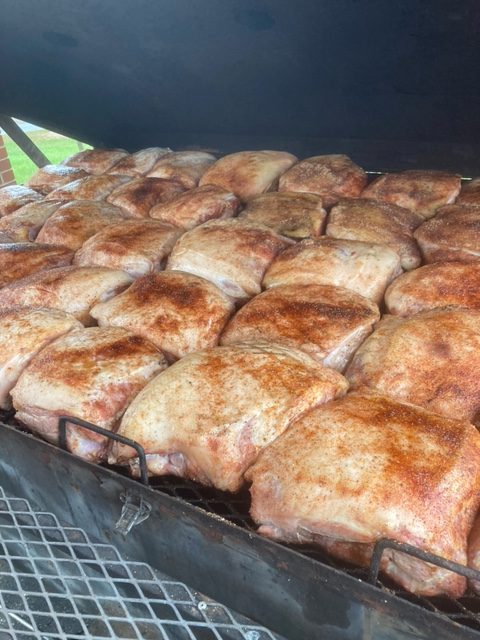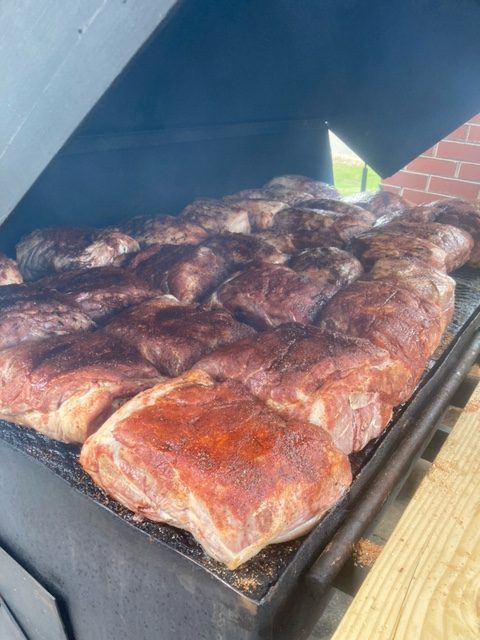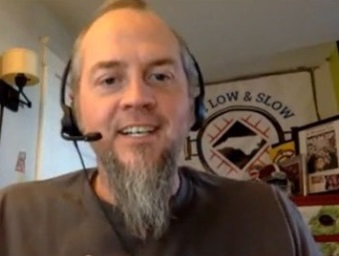If you’ve ever sat down with a plate of pulled pork and a group of people, you know a barbecue get-together can be the launching point for good things. In fact, when it comes to a community BBQ fundraiser, food is the foundation of doing good.
And we know plenty of groups that hold barbecue fundraisers. Schools, churches, youth groups, and charitable organizations. They sell chicken or pork plates to raise money for band uniforms, new church pews, and non-profit activities focused on helping others.
Other organizations turn BBQ into a relief operation.
Don’t forget the politicians. They love to chew the fat. For the annual barbecue at Mallard Creek Presbyterian Church in Charlotte, they’ve been pressing the flesh, discussing their platforms, and joining the masses to raise money for the church with smoked meat every October for 90+ years.
Carolina BBQ Fundraiser Tradition
Yes, in the Carolinas, BBQ and fundraisers go together like … pork and vinegar.
In this episode of the Low and Slow Barbecue Show, we meet a pair of charity BBQ experts who have spent decades smoking meat for good causes. They aren’t exactly sweet and sour, but Gene Scronce and Jody Dixon know the value in contrasting flavors for creating effective fundraisers that benefit worthwhile endeavors.
Please keep reading for highlights from our conversation. Take a deep dive into how they produce a BBQ fundraiser, including the lowdown on:
- The Why Behind a Charity BBQ
- BBQ 101: The Boston Butt Fundraiser
- The Perfect BBQ Fundraiser Menu
- Secrets of Success for a BBQ Fundraiser
Our BBQ fundraisers’ secret rub recipe is also in the information below this picture of Jody and Gene’s big raw butts.
👇👇👇

Why Put on a Charity BBQ?
The reason to season a Boston butt, cook it, and sell it for a charitable cause is not far from the reason anyone would want to spend time smoking meat low and slow. The reason is similar for a backyard barbecue expert.
There’s camaraderie. Time spent outdoors with meat and fire. The adventure of cooking something new. The pleasure of watching a barbecue taster take a bite, smile, and go for more. All good reasons to smoke meat.
For BBQ fundraisers Jody Dixon and Gene Scronce, there’s more to the charity BBQ recipe. As high school teachers in Newton, NC, they coordinate a BBQ fundraiser at least a couple of times a year.
“What we use the money for is not glamorous stuff. If we’ve got a kid that can’t afford a cap and gown for graduation or a family that needs help, that’s what our barbecue money goes for,” Jody says. “Every bit of money we raise goes to the kids.”
Sure, for these BBQ fundraisers, there are moments of pride. Scronce smiles when he talks about a second-place finish for barbecue chicken in Lincolnton’s Hog Happening barbecue competition. A tremble in his voice tells of a more meaningful moment coordinating a fundraiser while teaching at a Lincoln County high school.
“We did a fundraiser for a lady and her family. She had cancer, and that for me was one of the most important times,” Gene says. “I got to see how it affected the kids more than anyone else.”
BBQ Fundraisers Begin
And now, for 20 years Gene, and many times Jody, too, orchestrate charity BBQ events. Whether it’s cooking for civic clubs, animal welfare organizations, the Cat Square Christmas parade, or a BBQ fundraiser for their high school, there is a process integral to preparing a BBQ plate that will delight the masses.
“When you are done, you feel like you are part of something. … All of us want to be part of the community – however you want to define that community: your city, your neighborhood,” he continues. “For us, it is being part of the community and being able to give back to the students. It is what we should all be trying to do, what we need to do: help out when people need help.”
Plus, as Jody points out, cooking barbecue is “one of those things that’s a whole lot better to do than selling wrapping paper or candles.”
BBQ 101: The Boston Butt Fundraiser
A typical cook for the BBQ fundraisers usually involves 600-660 pounds of pork, almost 70 Boston butts weighing in at 8-10 pounds each. The Boston butt cut, Gene says, is a good choice for charity BBQ.
“No. 1, you don’t have to worry about the bone or shank if you do a shoulder,” he said. “And for most people in this area, [the Boston butt] has the correct amount of fat content, so when you chop it up, it stays moist a little bit better, and you don’t have to sauce it.”
Pre-saucing the meat, of course, often requires additional containers during cooking. That can lead to meat that is wet and harder to package.
Preparing the Boston Butt
A versatile meat rub has been the seasoning of choice for nearly 20 years. It includes a mix of brown sugar, kosher salt, black pepper, garlic and onion powder, and a few other things (see the recipe below.)
“We try to get the meat earlier in the day, set it out of the fridge around lunchtime, and let it sit out a couple of hours to let it warm up,” Gene explains. “We put the rub on … As the meat warms, it makes a liquid, and the rub dissolves in the liquids.”
After the cooker is loaded with meat, another heavy-handed sprinkle of rub across the fat caps amplifies the seasoning.
Finding the Right Fuel
“In my cooker, we start with charcoal and get it to heat the metal. Then we use Hickory, and I like to use cherry if I can find it,” Gene says.
Hickory wood goes into the smoker dry, while cherry wood usually gets a soak before the fire. The added water in the wood creates a little more steam and a little more smoke.
“We smoke 3-4 hours on wood, and then we switch to propane,” Gene says. “BBQ will take a lot of flavor, but if you do too much, it gets a little strong, and sometimes, it can get bitter. We like just enough smoke to know it is there, but not super strong.”
Pre-heating the Smoker
The barbecue fundraisers typically use several cookers to prepare the quantity of meat needed for their events. Gene’s 4 x 6 cooker will hold 43 Boston butts. Additional cookers provided by friends, some with rotisseries, support the meat smoking.
“When you start cooking a large amount of meat, you have to remember the amount of metal you have with the cooker is huge, and in order to get the metal hot, it takes a long time usually,” Gene says, adding his desired cooking temperature between 260 and 290.
“If it is a cold night, rainy or windy or something, the metal gets cool, and you will be battling that consistently,” he continues. “Once you get [the temperature right] usually, as long as the weather doesn’t change drastically, it will stay there, but it will take you 2 – 2.5 hours to get the temperature where you want it.”
Cooking Boston Butts Overnight
Depending on the size of each piece of meat, cooking 43 Boston butts on a cooker will take about 10 hours, a job that usually starts Thursday and continues into Friday.
“Once you close the lid, I flip the butts about every 3 hours. I do that because I think it makes the meat get a little more bark on it, and it gets a better smoke flavor.”
Selecting butts of roughly the same size will prevent uneven cooking. A piece of meat that is 2-3 pounds lighter gets done faster.
“Once you get to your time where you think they are getting ready, start checking it (using a meat thermometer). You may have to start pulling the smaller ones off,” Gene says. “Because if you leave it on, it will start to get mooshy.”

Preparing the Charity BBQ Plate
After a long night of work cooking and enjoying camaraderie – “telling lies and seeing people you haven’t seen for a while” – the cooked meat heads to the butcher block for chopping.
“Once it is done and we start to chop, we sprinkle rub in to chop the meat. We don’t add sauce, but we do add rub because when the meat is really warm, and you sprinkle it on, it melts the brown sugar and gives it a little salty flavor,” Gene says.
The Perfect BBQ Fundraiser Menu
“When you are fund-raising, you want to hit all the senses,” Gene says.
Sweet, savory, tart, salt. If you don’t hit all the flavors, you will leave your donors looking for more. The solution, tested and proven, combines the sour and spice of red cabbage slaw, tamed by the sweet flavor of a mild, popular barbecue sauce and the savory goodness of the smoked Boston butt.
For $10 a plate: pork barbecue with sauce on the side, a bag of chips, red slaw, baked beans, a dessert, a bread.
“Most people are surprised at how much food this is. We do give close to half a pound of barbecue on a plate along with other stuff,” Gene explains. “People eat some for lunch and save the rest for later.”
And depending on how much Jody procures through donation, the barbecue fundraiser scores a solid profit on each charity BBQ plate. (Listen to “barbecue secret time” on the podcast for the number – it’s higher than you might think!)
Secret to Success for a BBQ Plate Fundraiser
“If you can do it yourself, you will make way more money than if you try to bring someone else in and cook it,” Gene says. “And don’t try to rush it. If you can only get your cooker to 200, let it cook and hang out. You may be there longer, but the worst thing you can do is get it too hot. The next thing you know, the fat cap is burning. Even if you pull it off, it will have a char flavor people don’t like.”
The level of expertise Gene possesses, as well as his cooker, is why Jody says the secret to a successful BBQ fundraiser is to “get a Gene.” While Gene is the cook, “the easy job,” Jody explains the barbecue fundraiser has many roles to fill.
“A lot of times, my role ends up being how much can I get donated. The more we get donated, the more money we will raise in the fund-raiser,” Jody says. “I want to get everything donated, and I want that when somebody opens up a plate, they look at it and say this is a lot of food for 10 bucks, because I want them to come back.
“I don’t want to sell you anything you don’t want to buy,” he continues, “I just want you to eat lunch with us twice a year or however often it happens.”
Everybody has a Job to Do
Outside of cooking and procurement, a BBQ fundraiser also needs a lot of other leg work. School students sell pre-orders. Teachers collect money. Everybody works together, assembly-line style, to prepare the BBQ plates, then deliver them to hungry donors.
“Everyone has their role in what we are doing. For it to be successful, everybody has to do these things,” Jody says, adding the students help because they know what the fundraisers support – their peers. “That’s why the kids jump in and help and also because they see it. They know the kids that need help, the ones at Christmas time that may not be able to get things. Our school is good about holding that money back and doing it for the kids.”
BBQ Fundraiser ‘Multi-Versatile’ Boston Butt Rub
For BBQ fundraisers cooking in bulk, seasoning can be the most significant expense – and it is not usually an easily donated supply. To cook 600 pounds of Boston butt, you might need up to 18 pounds of brown sugar. The average cost can run $80-90 in spices – but it is a known expense and one that’s always budgeted.
The rub is applied liberally before cooking, on the top of the meat when it is put on the grill, and again sprinkled among the meat while it is warm during the chopping.
Gene Scronce’s Recipe for BBQ Fundraiser Rub
1 cup kosher salt
4 cups brown sugar
2/3 cup paprika
1/2 cup chili powder
1/2 cup coarse ground pepper
1/4 cup granulated garlic
1/8 cup cayenne pepper
1/8 cup cumin
1/8 cup onion powder
1/8 cup white pepper
Secret ingredient: Love
Adjust volumes based on desired quantities.
Add apple cider finger to the rub and mix to create a barbecue mop for chicken. Add that apple cider, Cheerwine, root beer, or another soda to a healthy dose of the rub, and boil it down for a sweet barbecue sauce to serve with your Boston butt.
Special thanks to Discovery High School history teacher Jody Dixon and science teacher Gene Scronce for sharing their insight with The Low & Slow Barbecue Show.
About the Author

Smoked meat, barbecue enthusiast, news journalist, and sports radio broadcaster Michael “Chigger” Willard collects a storybook of life captured through the lens of people he encounters. With a perspective seasoned by small town life in the Deep South, he dedicates conversations to uncovering savory nuggets of information, light-hearted moments of humor, and revealing glimpses of humanity.
Want more?
- Podcast Episodes
- Barbecue Blogs
- BBQ News & Recipes
Subscribe to The Lowdown BBQ Newsletter!


